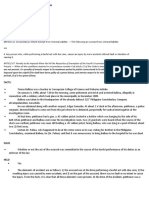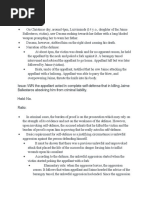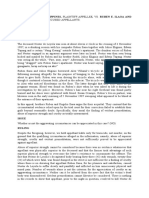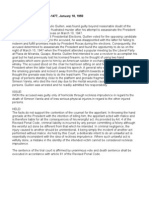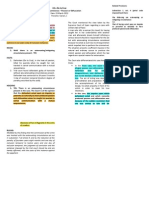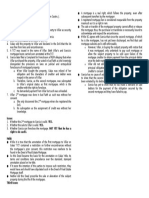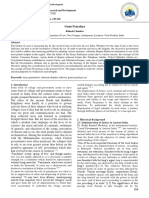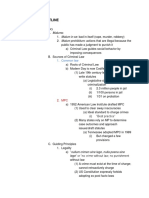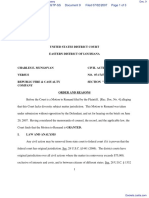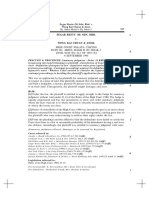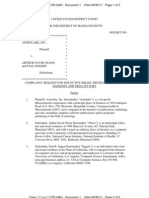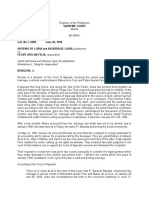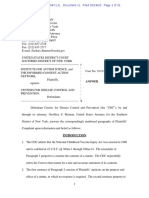62 United States v. Indanan
62 United States v. Indanan
Uploaded by
GSSCopyright:
Available Formats
62 United States v. Indanan
62 United States v. Indanan
Uploaded by
GSSOriginal Description:
Copyright
Available Formats
Share this document
Did you find this document useful?
Is this content inappropriate?
Copyright:
Available Formats
62 United States v. Indanan
62 United States v. Indanan
Uploaded by
GSSCopyright:
Available Formats
Title: #62 UNITED STATES v.
INDANAN directly with the intention of procuring the commission of the crime and
Details: G.R. No. L-8187 | Jan. 29, 1913 | J. Moreland that such inducement must be the determining cause of the crime.
Topic: Principal by Inducement
Doctrine:
Facts:
1. Indanan ordered the killing of Sarriol. He ordered Kalakyan, Suhuri and
Akiran to bring Sarriol to the Chinese cemetary in order to be killed.
2. The proofs demonstrate beyond question that Indanan was the
recognized headman of Parang (a governor), and it appears from the
testimony of the witnesses, Kalyakan, Suhuri, and Akiran, that he had a
very powerful influence over them, hence this power over them was
such that any order issued by him had the force and efficacy of
physical coercion.
3. People were scared of Indanan and Indanan can order anyone to be
killed.
Issue:
WON the domination of the accused over the persons who, at his orders, killed
the deceased was such as to make him responsible for whatever they did in
obedience to such orders. – YES
Held:
In the case at bar, the words and acts of the accused had the effect
of a command. There does not seem to have existed, however, any
official relation between the accused and the persons whom he
induced to kill Sariol. While he appears to have been the headman of
Parang, those whom he induced held no official position under him
and owed him, legally speaking, no obedience.
According to tradition and custom, however, the headman seems to
have been a person whose word was law and whose commands were
to be obeyed. Moreover, the accused represented to those who
physically committed the crime that he had a warrant from the
governor authorizing, if not requiring, the acts committed, and urged
upon them, in effect, that all must obey the commands of the
Government.
This representation was false, but it produced the same effect as if it
had been true. It cannot be doubted that the accused knew the
representation was false and purposely and intentionally made it as an
additional factor going to insure obedience to his orders.
It may be stated as a general proposition that, where the inducement
offered by the accused is of such a nature and made in such a way
that it becomes the determining cause of the crime, and such
inducement was offered with the intention of producing that result,
then the accused is guilty by inducement of the crime committed by
the person so induced.
The inducement to the crime must be intentional on the part of the
inducer and must be made directly for the purpose in view. It is
necessary to remember only that the inducement must be made
You might also like
- 2006 Dunblane Unburied by Sandra UttleyDocument133 pages2006 Dunblane Unburied by Sandra Uttleyrmstock100% (2)
- Sps. Nisce v. Equitable PCI BankDocument3 pagesSps. Nisce v. Equitable PCI BankGSSNo ratings yet
- 27 DIZON v. GABORRODocument1 page27 DIZON v. GABORROGSS100% (1)
- US vs. Augustus Hicks, 14 Phil. 217 (G.R. No. 4971), September 23, 1909Document1 pageUS vs. Augustus Hicks, 14 Phil. 217 (G.R. No. 4971), September 23, 1909Cill TristanNo ratings yet
- People Vs VillamorDocument2 pagesPeople Vs VillamorJc Isidro100% (1)
- Doctrine:: People V. GabresDocument4 pagesDoctrine:: People V. GabresLucyNo ratings yet
- Schmid Response To Plaintiff's Motion To Reconsider PDFDocument152 pagesSchmid Response To Plaintiff's Motion To Reconsider PDFJordan Tank100% (1)
- People v. IndananDocument2 pagesPeople v. IndananKristine0% (1)
- People V Kiichi OmineDocument2 pagesPeople V Kiichi Ominexynister designsNo ratings yet
- People V LeonorDocument1 pagePeople V LeonorPam RamosNo ratings yet
- People V RaveloDocument3 pagesPeople V Ravelopoppy2890No ratings yet
- People v. SangalangDocument2 pagesPeople v. SangalangElla Tho100% (1)
- People V Mananquil DigestDocument1 pagePeople V Mananquil DigestabbyNo ratings yet
- People v. HernandezDocument1 pagePeople v. HernandezSamantha Ann T. Tirthdas100% (1)
- 115 US Vs IndananDocument1 page115 US Vs IndananEmmanuelle Xriz AtilNo ratings yet
- People V MananquilDocument2 pagesPeople V Mananquil上原クリスNo ratings yet
- People Vs PajaresDocument4 pagesPeople Vs PajaresDanny DayanNo ratings yet
- People v. NierraDocument5 pagesPeople v. NierraAngelica Alvero100% (1)
- Pomoy vs. People 439 SCRA 439 G.R. No. 150647Document2 pagesPomoy vs. People 439 SCRA 439 G.R. No. 150647John Rey Feraren100% (4)
- US vs. Hilario Dela Cruz, 22 Phil. 429 (G.R. No. L-7094), March 29, 1912Document1 pageUS vs. Hilario Dela Cruz, 22 Phil. 429 (G.R. No. L-7094), March 29, 1912Cill TristanNo ratings yet
- US Vs Vicentillo. Art 12. Insuperable CauseDocument1 pageUS Vs Vicentillo. Art 12. Insuperable CauseMarkDungo100% (2)
- 5 People v. NunagDocument2 pages5 People v. NunagMikhel BeltranNo ratings yet
- People V Kiichi OmineDocument2 pagesPeople V Kiichi OmineCecille Sarita100% (2)
- People V SumicadDocument1 pagePeople V SumicadPam Ramos100% (1)
- People V DecenaDocument2 pagesPeople V DecenaCedrickNo ratings yet
- People V Guerrero, 2002Document5 pagesPeople V Guerrero, 2002Mae BernadetteNo ratings yet
- Digest People vs. Doquena (68 PhilDocument3 pagesDigest People vs. Doquena (68 PhilKennethQueRaymundoNo ratings yet
- People v. Ravelo: Facts: The Accused Pedro Ravelo, BonifacioDocument3 pagesPeople v. Ravelo: Facts: The Accused Pedro Ravelo, BonifacioNathalie Jean Yap100% (1)
- Pomoy V PeopleDocument2 pagesPomoy V Peoplesai_bautista_1100% (1)
- People v. Belonio, 429 SCRA 579 (2004)Document2 pagesPeople v. Belonio, 429 SCRA 579 (2004)Nico IanNo ratings yet
- 60 CRIM1-People v. Apduhan (L-19491)Document2 pages60 CRIM1-People v. Apduhan (L-19491)Dennisgilbert GonzalesNo ratings yet
- People of The Philippines v. Agapito de La CruzDocument2 pagesPeople of The Philippines v. Agapito de La Cruzmypc143No ratings yet
- THE PEOPLE OF THE PHILIPPINES vs. SY PIODocument3 pagesTHE PEOPLE OF THE PHILIPPINES vs. SY PIONico Ian100% (2)
- (CD) People Vs Ilaoa - G.R. No. 94308 - AZapantaDocument2 pages(CD) People Vs Ilaoa - G.R. No. 94308 - AZapantaBlopper XhahNo ratings yet
- United States V MackDocument1 pageUnited States V MackRae Angela Garcia100% (2)
- People V Madali Digested 67Document2 pagesPeople V Madali Digested 67jim schaultz100% (3)
- People v. Trinidad, 169 SCRA 51Document1 pagePeople v. Trinidad, 169 SCRA 51RayBradleyEduardo100% (2)
- G.R. No. 80130 August 19, 1991 BENJAMIN ABEJUELA, Petitioner, People of The Philippines and Court of Appeals, RespondentsDocument2 pagesG.R. No. 80130 August 19, 1991 BENJAMIN ABEJUELA, Petitioner, People of The Philippines and Court of Appeals, RespondentsUrsulaine Grace FelicianoNo ratings yet
- Plaintiff/Appellee Defendant/Appellant: People V FallerDocument2 pagesPlaintiff/Appellee Defendant/Appellant: People V FallerTintin SumawayNo ratings yet
- US v. AdiaoDocument1 pageUS v. AdiaoSamantha Ann T. TirthdasNo ratings yet
- 96 People v. SalvillaDocument2 pages96 People v. SalvillaKED100% (2)
- People v. VengcoDocument2 pagesPeople v. VengcoSamantha Ann T. Tirthdas50% (2)
- Crim DigestsDocument3 pagesCrim DigestsColee Stifler0% (1)
- G.R. No. 4971 September 23. 1909 THE PEOPLE OF THE PHILIPPINES, Plaintiff-Appellant, vs. AUGUSTUS HICKS, Defendant-AppellantDocument2 pagesG.R. No. 4971 September 23. 1909 THE PEOPLE OF THE PHILIPPINES, Plaintiff-Appellant, vs. AUGUSTUS HICKS, Defendant-AppellantMaica MagbitangNo ratings yet
- People v. EriniaDocument1 pagePeople v. EriniaSamantha Ann T. TirthdasNo ratings yet
- United States v. Bumanglag, 14 Phil. 644 (1909)Document1 pageUnited States v. Bumanglag, 14 Phil. 644 (1909)Nico IanNo ratings yet
- 4 Crim1 - People Vs Espina - Sufficient ProvocationDocument2 pages4 Crim1 - People Vs Espina - Sufficient ProvocationJustin Reden BautistaNo ratings yet
- 8 US Vs EsmediaDocument7 pages8 US Vs EsmediaA M I R ANo ratings yet
- People Vs Hernandez 1925Document2 pagesPeople Vs Hernandez 1925MafarNo ratings yet
- 131 People V Kiichi OmineDocument1 page131 People V Kiichi OmineSDN HelplineNo ratings yet
- Us Vs BumanglagDocument1 pageUs Vs BumanglagColee StiflerNo ratings yet
- People v. GuillenDocument1 pagePeople v. GuillenJashel Nayve100% (5)
- (Crimlaw) People Vs Pagal GR No. L-32040Document1 page(Crimlaw) People Vs Pagal GR No. L-32040Aquino, JP100% (1)
- 137 US V AmparDocument1 page137 US V AmparTeodoro Jose BrunoNo ratings yet
- People of The Philippines vs. Epifanio Diokno, Et. Al., 63 Phil. 601 (G.R. No. L-45100), October 26, 1936Document2 pagesPeople of The Philippines vs. Epifanio Diokno, Et. Al., 63 Phil. 601 (G.R. No. L-45100), October 26, 1936Cill TristanNo ratings yet
- People vs. de LeonDocument2 pagesPeople vs. de LeonPrieti HoomanNo ratings yet
- 127B GR 118130 People V Lug-Aw - DigestDocument1 page127B GR 118130 People V Lug-Aw - DigestOjie SantillanNo ratings yet
- People V Magabo G.R. No. 139471 January 23, 2001Document2 pagesPeople V Magabo G.R. No. 139471 January 23, 2001John YeungNo ratings yet
- People v. CabatoDocument2 pagesPeople v. CabatoRiann Devereux100% (1)
- US V de La Cruz DigestDocument2 pagesUS V de La Cruz DigestNiq Polido100% (4)
- People V BalderaDocument2 pagesPeople V BalderaIra Agting100% (1)
- US vs. ManalindeDocument1 pageUS vs. ManalindeShanelle Tamayo NapolesNo ratings yet
- People V BorinagaDocument2 pagesPeople V BorinagaJoyleen Hebron100% (1)
- U.S. v. IndananDocument10 pagesU.S. v. IndananMa Antonetta Pilar SetiasNo ratings yet
- TITLE: Philippine Contractors Accreditation Board v. Manila WaterDocument1 pageTITLE: Philippine Contractors Accreditation Board v. Manila WaterGSSNo ratings yet
- 13 GARCIA v. VILLARDocument1 page13 GARCIA v. VILLARGSSNo ratings yet
- 50 Stronghold Insurance Co. v. Tokyu ConstructionDocument1 page50 Stronghold Insurance Co. v. Tokyu ConstructionGSSNo ratings yet
- 35 SPS. PARAS v. KIMWA CONSTRUCTIONDocument1 page35 SPS. PARAS v. KIMWA CONSTRUCTIONGSSNo ratings yet
- 28 SPS. LITONJUA v. L&R CORP.Document1 page28 SPS. LITONJUA v. L&R CORP.GSSNo ratings yet
- 42 ITCSI v. FGU InsuranceDocument1 page42 ITCSI v. FGU InsuranceGSSNo ratings yet
- JARAVATA v. SANDIGANBAYANDocument1 pageJARAVATA v. SANDIGANBAYANGSSNo ratings yet
- Phil Stock Exchange Inc Vs CA: 125469: October 27, 1997: J. Torres, JR: Second DivisionDocument11 pagesPhil Stock Exchange Inc Vs CA: 125469: October 27, 1997: J. Torres, JR: Second DivisionGSSNo ratings yet
- 87 PNCC v. CADocument1 page87 PNCC v. CAGSSNo ratings yet
- ALFREDO RODILLAS Y BONDOC v. THE HONORABLE SANDIGANBAYAN and THE PEOPLE OF THE PHILIPPINESDocument1 pageALFREDO RODILLAS Y BONDOC v. THE HONORABLE SANDIGANBAYAN and THE PEOPLE OF THE PHILIPPINESGSSNo ratings yet
- 19 ROSARIO TEXTILE CORP. v. HOME BANKERS SAVINGS & TRUST CODocument1 page19 ROSARIO TEXTILE CORP. v. HOME BANKERS SAVINGS & TRUST COGSSNo ratings yet
- Title: Calanoc v. CIR Doctrine: Facts:: WON The Assessment Is Correct. - YESDocument1 pageTitle: Calanoc v. CIR Doctrine: Facts:: WON The Assessment Is Correct. - YESGSS100% (1)
- 61 Campos V. People of The Philippines and First Women'S Credit CorpDocument1 page61 Campos V. People of The Philippines and First Women'S Credit CorpGSSNo ratings yet
- People V LungayanDocument1 pagePeople V LungayanGSSNo ratings yet
- Title: #79 MAGBANUA v. UY Details: G.R. No. 161003 - May 6, 2005 - J. Panganiban Topic: Novation (Subjective or Personal) Doctrine: FactsDocument1 pageTitle: #79 MAGBANUA v. UY Details: G.R. No. 161003 - May 6, 2005 - J. Panganiban Topic: Novation (Subjective or Personal) Doctrine: FactsGSSNo ratings yet
- 29 VINTOLA v. IBAADocument1 page29 VINTOLA v. IBAAGSSNo ratings yet
- Borromeo-Herrera V BorromeoDocument1 pageBorromeo-Herrera V BorromeoGSSNo ratings yet
- City of Manila v. Del RosarioDocument1 pageCity of Manila v. Del RosarioGSSNo ratings yet
- People v. IrangDocument1 pagePeople v. IrangGSSNo ratings yet
- 25 Hernandez v. DolorDocument1 page25 Hernandez v. DolorGSSNo ratings yet
- CMTA NotesDocument7 pagesCMTA NotesGSSNo ratings yet
- Jinggoy Estrada v. SandiganbayanDocument2 pagesJinggoy Estrada v. SandiganbayanGSSNo ratings yet
- 19 Rosario Textile Corp. v. Home Bankers Savings & Trust Co.Document1 page19 Rosario Textile Corp. v. Home Bankers Savings & Trust Co.GSS100% (1)
- Gago v. MamuyacDocument1 pageGago v. MamuyacGSSNo ratings yet
- Roberto Cruz v. Court of AppealsDocument1 pageRoberto Cruz v. Court of AppealsGSSNo ratings yet
- Javier v. AnchetaDocument1 pageJavier v. AnchetaGSS100% (1)
- 12 Games and Garmentsdevelopers, Inc. v. Allied Banking Corp.Document1 page12 Games and Garmentsdevelopers, Inc. v. Allied Banking Corp.GSS100% (1)
- Jaravata v. SandiganbayanDocument1 pageJaravata v. SandiganbayanGSSNo ratings yet
- Lina Joyce VDocument1 pageLina Joyce VCamela Jane T LavanderoNo ratings yet
- Wong v. CADocument11 pagesWong v. CAAna BalceNo ratings yet
- Gram Nyayalaya PDFDocument12 pagesGram Nyayalaya PDFSiddharthNo ratings yet
- Legal Prof Case DigestDocument10 pagesLegal Prof Case DigestConnieAllanaMacapagaoNo ratings yet
- Moot Court Exercise - 3Document12 pagesMoot Court Exercise - 3usha242004No ratings yet
- City Limits Magazine, November 1997 IssueDocument40 pagesCity Limits Magazine, November 1997 IssueCity Limits (New York)No ratings yet
- People Vs Salvador Digest PDFDocument6 pagesPeople Vs Salvador Digest PDFReham PandapatanNo ratings yet
- United States v. William A. Borders, 693 F.2d 1318, 11th Cir. (1982)Document21 pagesUnited States v. William A. Borders, 693 F.2d 1318, 11th Cir. (1982)Scribd Government DocsNo ratings yet
- Criminal Law OutlineDocument37 pagesCriminal Law OutlineMarisa GarciaNo ratings yet
- Ivler vs. Modesto-San PedroDocument30 pagesIvler vs. Modesto-San PedroRay MacoteNo ratings yet
- Evidence - Judge Sia: Trial ObjectionsDocument4 pagesEvidence - Judge Sia: Trial ObjectionsMonicaSumangaNo ratings yet
- Mungovan v. Republic Fire & Casualty Company - Document No. 9Document3 pagesMungovan v. Republic Fire & Casualty Company - Document No. 9Justia.comNo ratings yet
- Wake County Family Court RulesDocument46 pagesWake County Family Court RulesScott AllenNo ratings yet
- Hunter - The Vigil - SAS - Murder Will OutDocument40 pagesHunter - The Vigil - SAS - Murder Will Out4thGen100% (1)
- Inquiry Misconduct Paedophilia Kimmins Report Ref 5 1998Document19 pagesInquiry Misconduct Paedophilia Kimmins Report Ref 5 1998Australian Human RightsNo ratings yet
- Comparative Essay OutlineDocument5 pagesComparative Essay OutlineSamantha ChanNo ratings yet
- Segar Restu (M) Sdn. Bhd.Document5 pagesSegar Restu (M) Sdn. Bhd.Jos KwanNo ratings yet
- 66 Posadas Vs CA PDFDocument2 pages66 Posadas Vs CA PDFKJPL_1987No ratings yet
- Haren Pandya Murder Case JudgementDocument120 pagesHaren Pandya Murder Case JudgementSampath BulusuNo ratings yet
- CASE11 CV 11725Document8 pagesCASE11 CV 11725andy2967No ratings yet
- United States v. Fatih Sonmez, 4th Cir. (2015)Document15 pagesUnited States v. Fatih Sonmez, 4th Cir. (2015)Scribd Government DocsNo ratings yet
- Caliwan V OcampoDocument1 pageCaliwan V Ocampo001nooneNo ratings yet
- Marriage-De Loria - Apiag Full Text-DigestDocument43 pagesMarriage-De Loria - Apiag Full Text-DigestAngel UrbanoNo ratings yet
- Kuchciak v. Cox Et Al - Document No. 4Document7 pagesKuchciak v. Cox Et Al - Document No. 4Justia.comNo ratings yet
- Shridhar Sahoo and Ors Vs State of Odisha and OrsDocument5 pagesShridhar Sahoo and Ors Vs State of Odisha and OrsjuhiNo ratings yet
- INSTITUTE FOR AUTISM SCIENCE, and THE INFORMED CONSENT ACTION NETWORK vs. CDCDocument15 pagesINSTITUTE FOR AUTISM SCIENCE, and THE INFORMED CONSENT ACTION NETWORK vs. CDCWAKESHEEP Marie RNNo ratings yet
- Tacoma Police Department Policies PDFDocument177 pagesTacoma Police Department Policies PDFZamara BennettNo ratings yet
- Interview With Steve McQueenDocument5 pagesInterview With Steve McQueenKittyojr0% (1)


















